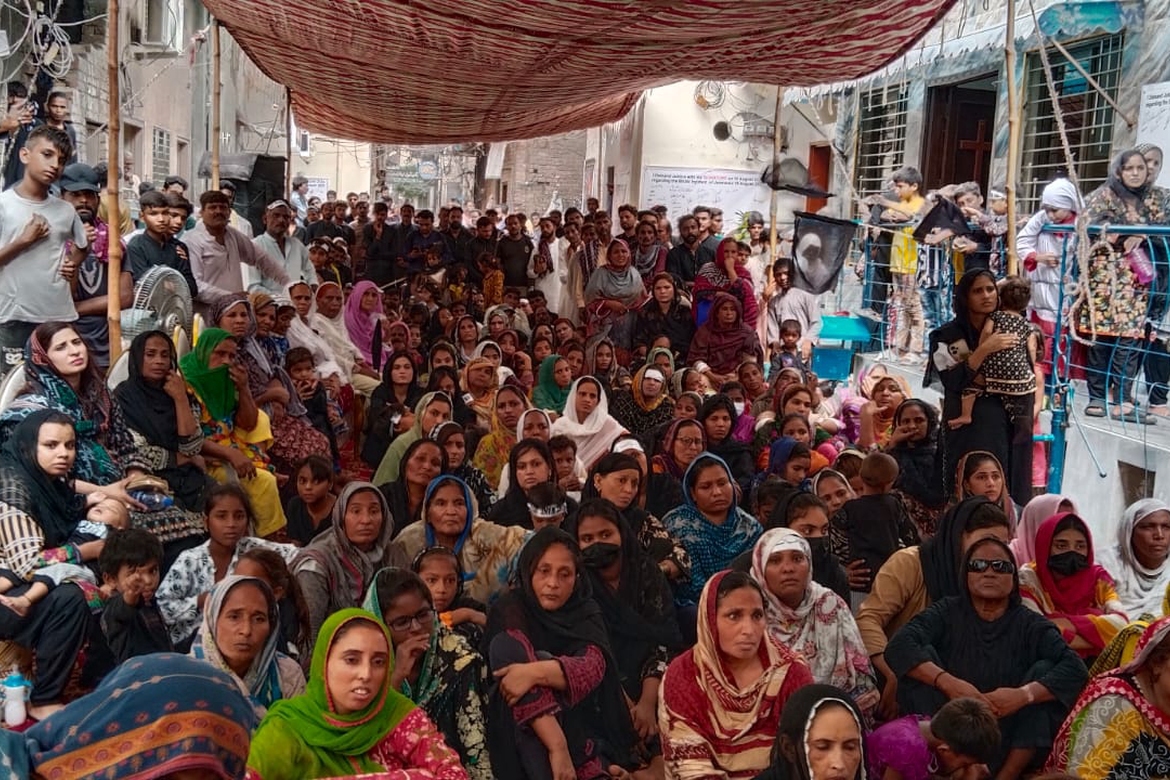Christians Are Not the Only Persecuted Minority in Pakistan
Christians in Pakistan Fear New Extremist Attacks — But Other Minorities Also Face Hate and Violence.

Memorial Service Held in Catholic Church in Jaranwala, One Year After the Attack That Destroyed 25 Churches and 90 Homes.
First published on Stefanus.no August 2024. Written by Johannes Morken. Photo: The Catholic Church in Jaranwala
Last year, Christians in Pakistan were the most vulnerable non-Muslim minority. However, other minority groups also suffer severely from hateful rhetoric and extremist violence.
On July 25, the Norwegian newspaper Dagen reported a rise in attacks on Christians in Pakistan, often triggered by baseless accusations of blasphemy. The article followed the killing of several Christians earlier this year, including Nasir Masih in Sargodha. Masih was lynched by a mob of hundreds after being accused of desecrating a Quran.
Christians in Pakistan live as barely second-class citizens. The year 2023 saw an increase in blasphemy-related attacks, with Christians being the most targeted minority.
On August 16 this year, Christians in Jaranwala marked a "Black Day" to commemorate a tragic event exactly one year earlier when an extremist mob vandalized and burned an entire Christian neighborhood. No lives were lost, as the Christian residents escaped in time, assisted by Muslim neighbors.
This attack was the worst on Christians in several years and coincided with an attempt in Pakistan's National Assembly to expand the scope of blasphemy laws—an effort that stalled for lack of the president's signature.
The Jaranwala attack deepened the fear among Christians. While public assistance has helped rebuild churches and homes, no action has been taken to prosecute the mob or curb extremism nationwide. The police investigation failed to hold the perpetrators accountable, with most of the over 100 arrested being released on bail. In February this year, Pakistan’s Chief Justice rejected the police report as grossly inadequate.
A Culture of Impunity
This lack of accountability has emboldened extremists, leading to further attacks. These acts have dire consequences for an already vulnerable Christian minority, many of whom lose their livelihoods as they are forced to hide from violent mobs.
Those who make unfounded accusations of blasphemy, often destroying lives, are rarely punished.
Widespread Abuse of Blasphemy Laws
As Christians, we must not forget that Pakistan’s blasphemy laws are frequently weaponized against people of other faiths or even "deviant" Muslim beliefs. Blasphemy accusations are also used as tools in personal disputes. Accusing an opponent of blasphemy in a land dispute, for example, is an effective way to have them jailed.
Religious minorities across Pakistan face immense pressure. Ahmadis, a community banned from identifying as Muslims in Pakistan, are frequent targets of hate and violence. In 2023, there were 36 attacks on Ahmadi places of worship, compared to 25 churches attacked in Jaranwala alone, according to a report from the Pakistani Centre for Social Justice.
The same report reveals that of the 329 individuals arrested for blasphemy in 2023, three-quarters were Muslims, with half of them being Shia Muslims. Shia Muslims, a minority in the Sunni-majority nation, face oppression and periodic persecution. Eleven of the accused were Christians.
The Centre for Social Justice systematically documents how Christians, Ahmadis, and Shia Muslims are subjected to hateful rhetoric and extremist violence.
Threats to Religious Freedom
Recently, extremist death threats pressured Pakistan’s Supreme Court to reverse parts of a prior ruling that recognized religious freedom for Ahmadis. Extremists regard Ahmadis as heretics and prohibit them from calling themselves Muslims.
Ahmadi Mubarak Sani, previously granted bail based on constitutional protections for religious practice, saw those protections overturned following death threats from the extremist group TLP (Tehreek-e-Labbaik Pakistan). Judges bowed to the threats, striking down sections of the ruling that supported Sani’s right to practice his faith.
The Supreme Court’s reversal shocked human rights activists and church leaders, who fear worsening conditions for Ahmadis and other minorities.
Sunni Muslims Also Targeted
Even Sunni Muslims face mob violence over blasphemy accusations. In February, a mob of at least 50 stormed a police station to seize a Muslim man accused of desecrating a Quran. When police refused to hand him over, the mob attacked the station, forcing officers to flee. The man was lynched, and the station was set ablaze.
In Punjab Province alone, 551 individuals were imprisoned for blasphemy as of November 2023, 45 of whom were convicted. Among them is Asif Pervaiz, a Christian father of four sentenced to death in 2020 after being arrested in 2013. He continues to await his appeal.
Another prisoner, Junaid Hafeez, a Muslim and Fulbright scholar, has been imprisoned since 2013 after students accused him of blaspheming Muhammad on social media. Since 2014, Hafeez has been held in solitary confinement. His first lawyer was murdered, and in 2019, Hafeez was sentenced to death.
A Call to Stand Together
Yes, Christians in Pakistan face severe persecution, but they are not alone. As Christians, we are called to advocate for all victims of extremist hatred and violence. Our partners in Pakistan are building alliances with other religious minorities and Muslim actors to protest violence and work for a better future—for Christians, other minorities, and Pakistan as a whole.